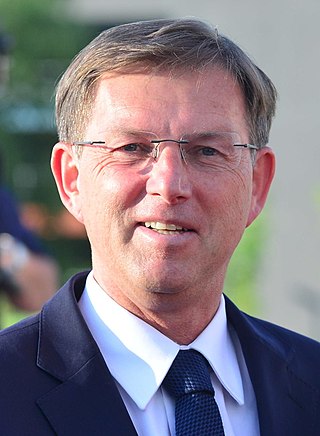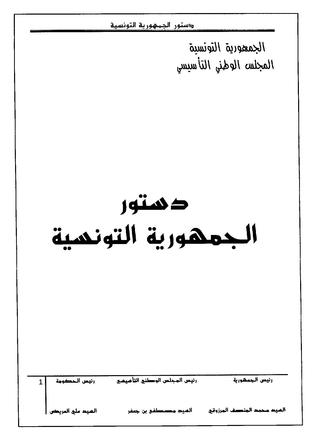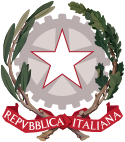
Ireland is a parliamentary, representative democratic republic and a member state of the European Union. While the head of state is the popularly elected President of Ireland, it is a largely ceremonial position, with real political power being vested in the Taoiseach, who is nominated by the Dáil and is the head of the government.

The government of Italy is in the form of a democratic republic, and was established by a constitution in 1948. It consists of legislative, executive, and judicial subdivisions, as well as a Head of State, or President.

The Constitution of the Republic of Croatia is promulgated by the Croatian Parliament.

The Constitution of the Islamic Republic of Iran is the supreme law of Iran. It was adopted by referendum on 2 and 3 December 1979, and went into force replacing the Constitution of 1906. It has been amended once, on 28 July 1989. The constitution was originally made up of 175 articles in twelve chapters, but amended in 1989 to 177 article in fourteen chapters.

The Italian Parliament is the national parliament of the Italian Republic. It is the representative body of Italian citizens and is the successor to the Parliament of the Kingdom of Sardinia (1848–1861), the Parliament of the Kingdom of Italy (1861–1943), the transitional National Council (1945–1946) and the Constituent Assembly (1946–1948). It is a bicameral legislature with 600 elected members and a small number of unelected members. The Italian Parliament is composed of the Chamber of Deputies, as well as the Senate of the Republic.

The Constitution of the Italian Republic was enacted by the Constituent Assembly on 22 December 1947, with 453 votes in favour and 62 against. The text, which has since been amended sixteen times, was promulgated in an extraordinary edition of Gazzetta Ufficiale on 27 December 1947. The Constituent Assembly was elected by universal suffrage on 2 June 1946, on the same day as the referendum on the abolition of the monarchy was held, and it was formed by the representatives of all the anti-fascist forces that contributed to the defeat of Nazi and Fascist forces during the Italian Civil War. The election was held in all Italian provinces. The Constitution was drafted in 1946 and came into force on 1 January 1948, one century after the Constitution of the Kingdom of Italy, the Statuto Albertino, had been enacted.
The Constitution of the Republic of Iraq is the fundamental law of Iraq. The first constitution came into force in 1925. The current constitution was adopted on September 18, 2005 by the Transitional National Assembly of Iraq, and confirmed by constitutional referendum, held on October 15, 2005. It was published on December 28, 2005 in the Official Gazette of Iraq, in Arabic original, and thus came into force. An official translation into English for international use was produced in cooperation between Iraqi state authorities and the United Nations' Office for Constitutional Support. Since 2006, several proposals for adoption of various constitutional amendments were initiated. The Kurdish language is official at state level.

The government of France, officially the Government of the French Republic, exercises executive power in France. It is composed of the prime minister, who is the head of government, as well as both senior and junior ministers. The Council of Ministers, the main executive organ of the government, was established in the Constitution in 1958. Its members meet weekly at the Élysée Palace in Paris. The meetings are presided over by the President of France, the head of state, although the officeholder is not a member of the government.

The Constitution of Kosovo is the supreme law of the Republic of Kosovo, a territory of unresolved political status. Article four of the constitution establishes the rules and separate powers of the three branches of the government. The unicameral Assembly of the Republic exercises the legislative power, the executive branch led by the President and the Prime Minister which are responsible for implementing laws and the judicial system headed by the Supreme Court.

The Constitution of Armenia was adopted by a nationwide Armenian referendum on July 5, 1995. This constitution established Armenia as a democratic, sovereign, social, and constitutional state. Yerevan is defined as the state's capital. Power is vested in its citizens, who exercise it directly through the election of government representatives. Decisions related to changes in constitutional status or to an alteration of borders are subject to a vote of the citizens of Armenia exercised in a referendum. There are 117 articles in the 1995 constitution. On November 27, 2005, a nationwide constitutional referendum was held and an amended constitution was adopted. The constitution was amended again in a national referendum on December 6, 2015 that changed the political structure from a semi-presidential system to a parliamentary republic.
The federal government of Iraq is defined under the current Constitution, approved in 2005, as an Islamic, democratic, federal parliamentary republic. The federal government is composed of the executive, legislative, and judicial branches, as well as numerous independent commissions.
The Constitution of the Philippines is the constitution or the supreme law of the Republic of the Philippines. Its final draft was completed by the Constitutional Commission on October 12, 1986, and ratified by a nationwide plebiscite on February 2, 1987.

The Constitution of Uzbekistan was adopted on 8 December 1992 on the 11th session of the Supreme Council of Uzbekistan. It replaced the Constitution of the Republic of Uzbekistan of 1978. It is the supreme law of the Republic of Uzbekistan. The Constitution of Uzbekistan contains six parts and it is further divided into 26 chapters.

The Constitution of Ghana is the supreme law of the Republic of Ghana. It was approved on 28 April 1992 through a national referendum after 92% support. It defines the fundamental political principles, establishing the structure, procedures, powers and duties of the government, structure of the judiciary and legislature, and spells out the fundamental rights and duties of citizens. It is made up of 26 chapters, not including the preamble.

Antonio Marzano is an Italian economist, academic and politician, who served as the minister of productive activities in the second cabinet of Silvio Berlusconi from 2001 to 2005.

Miroslav Cerar Jr. is a Slovenian law professor and politician. He was Prime Minister of Slovenia, leading the 12th Government. He served as Deputy Prime Minister and Minister of Foreign Affairs in the 13th Government. He is a full professor at the Chair of Theory and Sociology of Law at the University of Ljubljana Faculty of Law.

The Tunisian Constitution of 2014 was adopted on 26 January 2014 by the Constituent Assembly elected on 23 October 2011 in the wake of Tunisia's Jasmine Revolution that overthrew President Zine El Abidine Ben Ali. It was passed on 10 February 2014, replacing the constitutional law of 16 December 2011 that temporarily formed the basis of government after the suspension of the Constitution of 1959.

A constitutional referendum was held in Italy on 4 December 2016. Voters were asked whether they approved a constitutional law that amends the Italian Constitution to reform the composition and powers of the Parliament of Italy, as well as the division of powers between the State, the regions, and administrative entities.

The Economic and Social Council (CES) of Spain is one of the two advisory bodies that assist the Government of Spain in its duties. It is the body responsible for advising the Government in socioeconomic and work matters.

Tiziano Treu is an Italian politician and academic, former Minister of Labour and Social Security and Minister of Transports, and former president of the National Council for Economics and Labour.



















